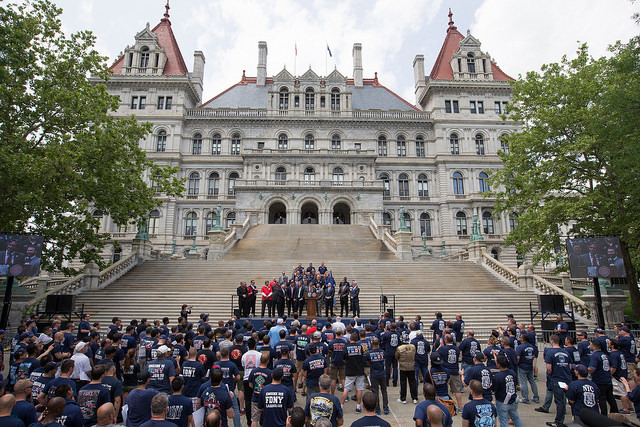
A rally at the capitol (photo: Governor's Office via flickr)
This summer treated New Yorkers to a spectacular display of the vulnerabilities of the New York region’s century-old subway system. Hardly a day passes without a rush hour social media meltdown because of delays and service interruptions. The MTA’s own data back this up: the authority is struggling to keep pace with historically high ridership while also upgrading the system.
The recent agreement struck between Governor Cuomo and Mayor de Blasio to fund the MTA five-year capital budget is encouraging, but it does not in any significant way address the agency’s failure to build and maintain infrastructure with cost-efficiency. The MTA will likely find much of the funding for the capital budget by taking on more debt.
In light of these struggles, recent (and upcoming) increases in subway fares should draw out the pitchforks -- or they would, if straphangers knew that most of the money doesn’t go to services for riders, but to paying MTA debt service, which has reached the size of whole national economies. According to the MoveNY Fair Plan, 17 percent of the MTA operating budget is spent on debt service. That’s equivalent to 47 cents of every MetroCard swipe -- and that number is rising.
Bringing MTA capital costs under control will require an overhaul of the agency’s organizational practices across the board, but why should large banks benefit from our daily commuting woes? Let’s cut Wall Street out of the equation and create a bank for the people of New York. We should be financing MTA capital projects, along with many other public goods, with a state-owned public bank.
By allowing the MTA to consolidate and refinance its debt at better rates, a public bank for New York would make available more funds for getting the New York region’s transit infrastructure to a state of good repair and expanding the transportation network.
A state bank can and should address other issues as well. It would support local community banks and credit unions in small towns and rural communities in places like Rensselaer, Niagara, and Allegany counties to make more small business and agricultural loans. It would offer competitive financing and loan products for new green technology and energy investments. By supporting local community banks and credit unions, perhaps in conjunction with a pilot program to offer banking services at post offices, it could crowd out predatory check-cashing businesses.
Finally, it would create a means for refinancing student loans, taking the strain off straphangers and students--two constituencies in which Governor Cuomo has shown limited interest.
The Bank of New York would be professionally staffed and independent from, but accountable to, both a citizen advisory board and elected representatives. Funds from state and local treasuries and from public benefit corporations like the MTA would make up the bank’s deposits.
Four times since 2011, lawmakers in Albany have introduced legislation to study a potential Bank of New York, but it has never been given a vote. It will take a social movement to make it happen. This is how reformers established the only existing state bank in the nation, in North Dakota, when a progressive populist movement swept the corrupt establishment from power. These actions helped communities weather the Great Depression, and today the Bank of North Dakota has bipartisan support from a broad range of constituencies in that deep red state.
Taking control of finance by creating a public bank sounds radical, but “radical,” which comes from the Latin word for “roots,” only means getting to the root of the problem. Sometimes it’s not enough to trim the weeds -- you have to pull them out and plant something new. Finance, like electricity, water, or the internet, is a public utility and can be harnessed for the public good or enrich a few. We've been doing the latter. We know that the Wall Street way isn’t working, but we’ve been sticking to it because we don’t yet see alternatives.
A state bank would pull out some Wall Street roots and plant new seeds based on economic democracy, a system that puts greater power in the hands of the people and communities that create our common wealth. Economic democracy is a deeply American tradition stretching from Thomas Paine to the agrarian anti-renters and Free Soilers of 19th century New York, to the leaders of the Civil Rights Movement who built institutions for community ownership in the Jim Crow South and marched on Washington for jobs and freedom.
Like any one part of a larger whole, a state bank alone won't solve all of our problems--transit or otherwise. But New Yorkers across the political spectrum see that our current system doesn’t work, and with greater economic democracy we have a systemic alternative.
A public bank would serve all New Yorkers: working and farming families, students and small business owners, drivers and straphangers. A coalition drawn from those constituencies would quickly transform any “radical” notion into a common sense solution. A state bank is one tool for the people of New York to push back against Wall Street power, move our economy forward and help us invest in the future of our transit system and our state as a whole, from Buffalo to Plattsburgh to Brooklyn.
Rather than waiting for Albany to do right by the people of New York, New Yorkers can promote these structural changes by voting “yes” in the constitutional convention referendum that will be on the ballot in 2017.
***
Matthew Rigney is a Master of City and Regional Planning candidate at Rutgers University. Evan Casper-Futterman is a PhD candidate in Public Policy at Rutgers University.
***
Have an op-ed idea or submission for Gotham Gazette? E-mail editor Ben Max: This email address is being protected from spambots. You need JavaScript enabled to view it.




